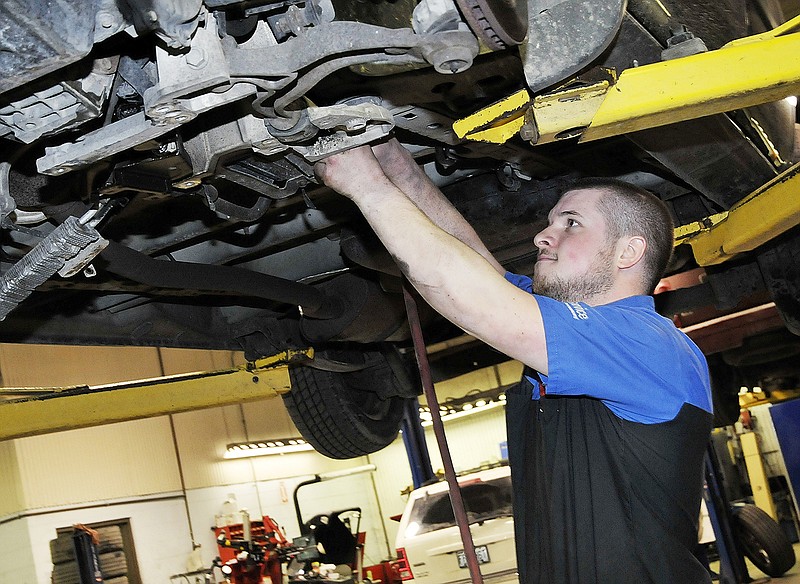More students are taking a second look at automotive repair, a high-tech career that is always in demand and can't be outsourced overseas.
For many, the first rung on the ladder is an education at Nichols Career Center, which has trained hundreds of students over the years and placed dozens in jobs at car dealerships and independent repair shops all over Jefferson City.
Dusty Simmons, 21, attended Nichols Career Center before graduating from Linn State Technical College in 2012. He grew up with a wrench in his hand, and by the age of 14 was restoring his first truck with the help of his dad.
"That started it all. My dad was a mechanic in the National Guard," he said. "We were always tinkering on something."
Today, he works at Capitol Chrysler Dodge Jeep Ram on Missouri Boulevard. He started as a part-time worker changing oil and shadowing the more-experienced employees. When he graduated, he became a full-time employee and enrolled in "Chrysler school," a series of classes that teach technicians how to repair Chrysler products.
Russell Richter, the dealership's fixed-operations director, said his people have to attend 128 classes to be considered "master certified."
Although some do enter the field with the know-how they learned fixing cars in the front drive, "if you want advancement, a credential from a school like Linn State is essential," Richter said.
According to the U.S. Bureau of Labor Statistics, the median pay for automotive service technicians and mechanics was $36,610 in 2012. Recent starting salaries for Linn State students were $25,438 on average, with a high of $41,600, according to a 180-day follow up report issued by the college. Experienced technicians can make upwards of $60,000.
Both Richter and Simmons said openings in the field are available, demand for skilled mechanics is high and the job pays a living wage.
"People are always wanting their cars to be worked on, and I enjoy helping people out," Simmons said.
Richter said he searches for qualified employees who are from Mid-Missouri, because he feels like they are more likely to stay with the company after it has invested in their initial training.
"I don't have any openings at the moment," he said. "But qualified local people are very challenging to find."
Simmons, like many young men, prefers to work with his hands. He said Nichols taught him the basics; Linn Tech fine-tuned his skills.
It was at Linn State that Simmons started to purchase the tools - he started with a $4,000 Snap On tool kit - that he'll use for the rest of his career. Auto technicians who enter the workforce have to amass their own tools, although manufacturers typically provide to dealerships some of the specialized ones needed to work on their products.
"It's a big investment," said Simmons. "But it's something you'll use to make a living for the rest of your life."
For many Mid-Missourians interested in the field, their learning starts at Nichols Career Center. The program trains 30 students every year; 15 in the morning and 15 in the afternoon. The program is certified by the National Automotive Technicians Education Foundation, a non-profits organization that works to improve the quality of training programs nationwide at secondary and post-secondary schools.
Joe Hires, Nichol's automotive technology instructor, ran an independent repair shop in Columbia before working as a teacher. The basic units of study are: regular maintenance; steering and suspension; brakes; electronics; engine performance; transmissions; and heating and cooling systems.
He loves sharing with students his passion for diagnosing a vehicle's problem. He loves the challenge of solving the puzzle. Hires said part of his job is to impart to students the persistence to keep working until the problem is fixed.
"It's the thrill of the kill," he said. "You get excited because you've beat it."
Hires said he's worked to develop relationships with the automotive shops and dealerships in town, so that his students can gain even more real-world experiences.
Parker Boling, 18, is an Nichols Career Center student intern at Capitol Chrysler. He spends his days maintaining customers' cars and working side-by-side with the older mechanics.
"It's definitely a nice spot to be," he said. "It's good to be able to get into the workforce and see if it's what we want to do."

